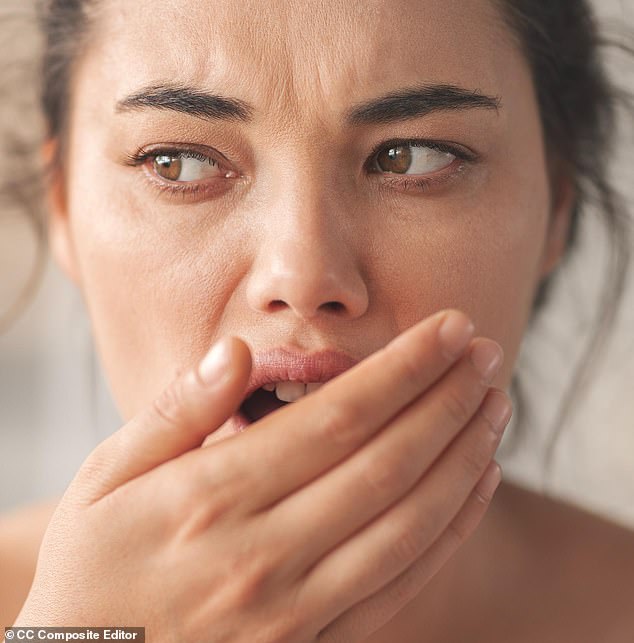At a recent check-up my dentist said I had bad breath caused by tonsil stones, which was mortifying. What can I do about it?
Dr Philippa Kaye answers: There are many possible causes of bad breath – or halitosis – and, yes, tonsil stones can be one of them.
Also known as tonsilloliths, these are small, hard lumps of calcified debris – made up of food particles, bacteria and dead cells – that collect in the tiny pits and crevices (called crypts) of the tonsils at the back of the throat.
The bacteria that form the stones also release sulphur compounds, which are responsible for the unpleasant smell and sometimes a bad taste in the mouth.
Good oral hygiene is essential. Brush your teeth carefully twice daily, floss between your teeth and use a tongue scraper every day. Gargling with warm salt water can help reduce bacterial build-up.
Staying well hydrated is important too, as a dry mouth can make tonsil stones more likely.
If you often breathe through your mouth because of nasal congestion, ask your GP or pharmacist for advice – treating that can help. And if you smoke, quit – it’s a major cause of bad breath and poor oral health.
Some people find gargling with dilute apple cider vinegar helps dissolve stones, but the acid can damage tooth enamel, so check with your dentist before trying this.

If you breathe via your mouth due to nasal congestion, ask your GP or pharmacist for advice
I’m in constant agony from shin splints. The pain stops me from exercising and it’s making my life miserable. What can I do about it?
Shin splints is the common name for medial tibial stress syndrome – pain along the front of the lower leg, around the tibia (shin bone).
It’s caused by inflammation of the muscles and connective tissue around the bone, usually from overuse or repetitive impact. It’s common in runners, dancers and anyone who suddenly increases their activity levels or trains on hard surfaces such as concrete. Poor running technique or worn-out shoes can also play a part.
The pain is typically felt on the inner edge of the shin, which may be tender or swollen. While it often improves with rest, persistent pain can lead to a stress fracture, so it’s worth taking seriously.
Apply ice for up to 20 minutes every few hours, and use paracetamol or ibuprofen gel for pain relief. Keep active with low-impact exercise such as swimming or cycling, and gently stretch your calves and ankles.
When you return to running, start slowly and build gradually. Invest in well-fitting trainers that support your feet properly. Adding strength training for your legs, hips, ankles and core can also help prevent recurrence.
If the pain persists, see a physiotherapist – in many areas you can self-refer on the NHS or your GP can make a referral.
I’m in my mid-40s and have had shingles twice – most recently it affected my eye and has caused some vision loss. Could I benefit from a vaccine, and would I ever be able to get one on the NHS?
I’m sorry to hear you’ve experienced vision loss – ocular shingles can be particularly distressing.
Shingles occurs when the chickenpox virus (varicella zoster), which lies dormant in the body after childhood infection, re-activates later in life.
Where the rash appears depends on which nerve the virus re-awakens in. In ocular shingles, the infection affects a branch of the trigeminal nerve – causing a painful rash on one side of the forehead, eyelid and sometimes the tip of the nose.
Eye symptoms can include pain, redness, swelling, blurred vision and light sensitivity. Without prompt antiviral and anti-inflammatory treatment, inflammation of the cornea can cause permanent visual loss, so urgent referral to an eye specialist is essential.
Regarding the shingles vaccine: on the NHS, it’s currently offered to all adults turning 65, those aged 70 to 79 and adults over 18 with a severely weakened immune system.
Privately, it’s available to anyone over 50. You can still have the vaccine even after having shingles, as it helps reduce the risk of future recurrences and may lessen the severity if it does return.
Write to Dr Philippa Kaye at Health, Daily Mail, 9 Derry Street, London, W8 5HY or email: health@mailonsunday.co.uk – include contact details. Dr Kaye cannot enter into personal correspondence. Replies should be taken in a general context. Consult your own GP with any health worries.
This article was originally published by a www.dailymail.co.uk . Read the Original article here. .

